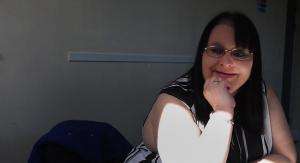'If I had more help I would still have my children at home'

Published by Professional Social Work magazine, 22 June, 2022
Adults with learning disabilities feel they have to fight to prove they are competent parents capable of looking after their children, new service user research has found.
Dr Kate Theodore, senior lecturer at Royal Holloway, University of London, and Daniel Foulds, a writer and researcher with a learning disability, presented the findings of qualitative research with Mind the Gap, a learning disability theatre company at the BASW conference.
Researchers interviewed 22 parents with learning disabilities - 17 mothers and five fathers - from across the UK.
A learning disabled research team collected accounts of parents’ experiences which were then turned into stories, theatre and films.
The team found parents with learning disabilities often felt powerless and had experienced assumptions of incompetence.
“Parents fight to prove their competence and want to claim power in their lives and speak up for their rights through parent peer-support and self-advocacy,” the authors noted.
The conference heard testimony from Paula, a parent with a learning disability.
In a video, Paula told how she met the father of her first child when she was 19, marrying when she was 22. It was an abusive relationship, which broke down after a year. Paula had two more children with another abusive partner.
Paula, who works at disabilities charity Skills for People, said: “My second child, she's got [autism]. That's when social services got involved. They knew I was struggling and I asked for their help and they wouldn't listen.”
Paula ended up going through child protection procedures when her marriage broke down: “I just felt worthless and [like I was treated] like a two-year-old. They wouldn’t listen.”
All three children ended up in care. Her son returned at weekends and when he was 17 he moved back in with her. Her middle daughter is fostered and she is able to see her during the holidays. Paula has annual letter contact with her youngest daughter who has been adopted.
She added: “Treat us like equals, not different. If I'd had more help, I would still have my children at home.”
The conference session acknowledged there is a lack of learning disability awareness among practitioners, and the need for small group training and mixed agency working.
Dr Theodore is now seeking social workers with experience of 'substituted parenting' or 'parenting by professionals/others' and what this term means in a family courts context.
If you have experience and want to contribute, contact sbstparenting-proj@bristol.ac.uk.
